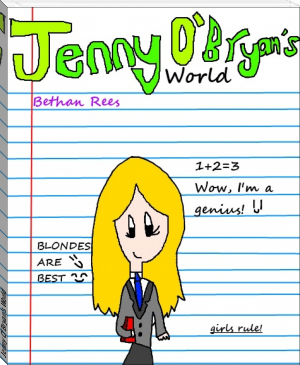The History and Records of the Elephant Club, Doesticks and Underhill [ereader with dictionary .TXT] 📗

- Author: Doesticks and Underhill
Book online «The History and Records of the Elephant Club, Doesticks and Underhill [ereader with dictionary .TXT] 📗». Author Doesticks and Underhill
"An interesting feature in the proceedings of the morning was a case in which Owen Shaughnessy, Patrick Mulholland, Michael O'Shea, Timothy Leahey, Dennis Maroney, Dermot McDermott, Phelim Flannegan, Bridget O'Keefe, Mary McBride, Ellen Dougherty and Bridget Casey were the defendants. As the Judge called out their names, the prisoners severally responded. They were all, as their names would indicate, of Irish birth. The men, evidently long-shoremen and laborers, and the women, servants. Their garments, in some instances, were torn, and in other ways disarranged and soiled. The men, and in one or two instances the women, showed bruises about their faces and hands, indicating their active participation in a recent scrimmage, from the effects of which they had not had the time, or soap and water, to enable them to recover.
"Mr. Gerald O'Grady, who stands at the head of[Pg 258] the bar at the Tombs, and who, under adverse circumstances and strong competition, has been enabled, by his talents, to keep up his tariff of fees, from which he has never deviated, appeared as counsel for the prisoners. Mr. O'Grady has never been known to defend a case for less than fifty cents, unless, actuated by feelings of commendable philanthropy, he has volunteered his professional services gratis. It may be reasonably supposed that his success has excited the envy of the 'shysters;' for while they have to sit oftentimes a whole morning beside their respective granite columns at the Tombs, without being called upon to defend a case, Mr. O'Grady's presence in the court-room is in frequent demand. Mr. O'Grady had been retained in this case, I learned, by seven of the defendants, at a certain specified fee for each man, he volunteering his professional services to the ladies without charge. He announced to the Court that he represented the defendants, and that they were ready to have the trial commence.
"'Is Mr. O'Grady your counsel?' the Judge inquired of the defendants.
"'Yes, yer honor,' said one of the parties addressed; 'didn't I pay him five shillings—divil a hap'ny less—for to defind me.'[Pg 259]
"'Five shillings?' said Mr. O'Grady, indignantly, 'you mane that as a retainer, of coorse.'
"Defendant.—I mane that's all ye'll get, anny how——
"Counsel (loudly).—Say, sir, it is time for you to know that, as a client, you should addhress the Coort only through your counsel. (To the Court.) Sir, my clients here, paceable citizens, stand ready for to answer, through me, to the diabolical chairges which designin' min have brought against thim, feelin' within their breasts——(Here Mr. O'Grady hit one of his clients a severe blow in his bread-basket).
"Assaulted Client.—Oh! h-h—.
"Counsel (to client).—Keep your mouth shut, why don't you? (To the Court.) Feelin', as I said before, widthin their breasts, the proud consciousness of their entire innocence of anny charges which their accusers could dare for to bring against thim.
"The witnesses were Sergeant Ferrett and Officers Snap, Catcher, O'Grasp, Ketchum, Holder, and Van Knabem.
"Officer Holder stated, in substance, that while patrolling his beat during Thursday night, the inmates of a house, No. 83½ Pacific Place, began to get very disorderly. From the howlings and noises[Pg 260] which he heard, he came to the conclusion that there was a wake in the house. Not desiring to stop the disturbance by any violent means, he knocked at the door, with the view of telling them that they were disturbing the public peace, and requesting them to desist. No response was made to his knock. He then put his mouth to the keyhole of the door, and announced to them, as audibly as he could, that unless they desisted, he should have to call other officers and arrest them. No attention was paid to his words. Sergeant Ferrett arrived soon after, and inasmuch as the disturbance continued to increase, they called in the other officers to make a descent on the place, not, however, until they had first endeavored, by their voices, to make the inmates of the house understand the consequence to them, in case they persisted in their unlawful course. Officer Ketchum, who had formerly patrolled the beat, knew of a rear entrance to the house through an alley, and they accordingly entered the house by that way. They found about twenty persons present, men and women, engaged in a promiscuous scrimmage, howling, drinking, and fighting. The orders of the sergeant to cease their disturbance did not avail anything, which decided them to arrest the leading actors in the scene, which they forthwith[Pg 261] accomplished, after some considerable resistance on the part of the company. They brought them to the station-house. The remainder of the party subsequently retired or left the place, which was quiet for the rest of the night.
"The remaining officers confirmed the evidence of officer Holder, in such of its particulars as they were acquainted with. All of them were cross-questioned, more or less, by Mr. O'Grady, without, however, eliciting any new facts of material interest.
"Mr. O'Grady introduced, as a witness for the defense, Mrs. Katheleen Hennesy.
"Mrs. Hennesy is a lady of about forty-five years of age, five feet ten inches in height, weighing about two hundred and fifty pounds. She has a florid face. Her dress was remarkable for the extent with which it was ornamented with highly-colored ribbons and laces, gathered in fantastic bows.
"Mr. Blotter, the clerk, administered the usual oath.
"Mrs. Hennesy, having kissed the book, the examination was commenced.
"Mr. O'Grady.—Misthress Hennesy, will you state to the Coort if you're the proprietor of the house No. 83½ Pacific Place.
"Mrs. Hennesy.—Av coorse I am, and divil a[Pg 262] hap'ny is there owin' to anny man for what's inside of it.
"Mr. O'G.—What kind of a house do you keep there?
"Mrs. H.—Is it for to prove that the charackther of me house is not good that yer afther axin' the question?
"Mr. O'G.—Misthress Hennesy, could ye make it convanient to thrate this Coort wid becoming respect, by answerin' the questions that I put to ye, for the purpose of establishin' a definse of these ladies and gintlemen, some of whom, I am towld, are inmates of yer house? What kind of a house, I'll ax ye wonst more, do ye keep?
"Mrs. H.—It's a respectable, honest boordin'-house; bad luck to the blackgaird that says it's not.
"Mr. O'G.—Will you plase to state to the Coort the facts of the unfortunate occurrence that thranspired in yer house last night?
"Mrs. H.—For the matther o' that, there's mighty little for to tell; for it was nothin' more nor a wake, barrin' that the corpse come to life widout showin' the civility of first tellin' the mourners that he wasn't dead at all at all, and sayin', 'By yer lave, I'd rather not be, av it's all the same to yez.'
"Mr. O'G.—It's about that, Misthress Hennesy,[Pg 263] that his honor is a waitin' for ye to spake of. Now, thin, will ye relate the facts?
"Mrs. H.—Well, plase yer honor, it was yestherday mornin' airly that I heard Timothy Garretty was up stairs in his room, very sick, and like to die. I dhressed myself, and sent for the docther, and went up stairs; and throth Tim was a lyin' there in wan of his fits, wid which he had been often throubled before; and before the docther could come to him, the circulation of his brathin' had stopped entirely. Well, yer honor, Tim had manny frinds in the house, and as he was an owld boordher, we thought to howld a wake over his body. He was laid out, and put into a coffin. At night all of his frinds come into the room, where everything was illegantly arranged for the wake. They had begun to dhrink their whisky, and was enjoyin' themselves in a gintale way, whin Pat Mulholland, he sthruck Mike O'Shea over the eye for somethin' that Mike had said, and wid that Mike's frinds and Pat's frinds got themselves mixed up in a free fight together. At that time, plase yer honor, who should I see arisin' from the coffin but Timothy Garretty himself, and restin' on his hands. By my sowl I was freckened, for I thought it was Tim's apparition that was appearin'. Thin Tim spoke up; 'Bad luck to yez,'[Pg 264] says he, 'isn't it a fine thing yez is doin'—havin' the whisky flowin' free, and a free fight, too, and keepin' me a lyin' in this blackgaird box on the broad of me back, widout ever so much as axin' me if I had a mouth on me at all at all?' Wid that somebody who was a strikin' happened to hit Timothy a clout in the eye, which knocked him back into the coffin.

"'Who the divil did that?' sez Tim, as he made a spring from the coffin on to the floor, dhressed all up in his white clothes. 'Show me the man that shtruck me in me eye;' and wid that Tim he commenced a shtrikin' out, and he shtruck Dennis Marony under the but of the lug. Whin they saw Tim out of his coffin, they stopped a fightin', and fell[Pg 265] on their knees, and commenced a sayin' their prayers. 'What's the matther wid yez?' says Tim.
"'Are ye not dead?' says Larry O'Brien.
"'Yes, as dead as a nest of live flaze,' says Tim.
"'Then yer alive,' says they.
"'Thry me wid some whisky,' says he; and wid that they got up and give Tim some whisky, which he never dhrank wid a betther grace nor thin. Well, as Tim wasn't dead, they couldn't howld the wake, but they said it would be a pity to lave the whisky to spoil, so they agreed that they'd have the spree just the same. Tim was purty wake from his fit, and so it didn't take long to make him dead dhrunk, whin we laid him in his bed. Afther that, yer honor, they kept on a dhrinkin', and was fightin' in the most frindly way, whin the M.P.s come into the door, and tuck some of thim off to the station-house. I thin shut up the house, and the rest wint to bed.
"Judge.—Mrs. Hennesy, where is Timothy, the corpse?
"'Here, sir,' said a cadaverous-looking Hibernian, 'a little the worse for dyin' widout bein' very dead.'
"Judge.—I think you're good for a few years yet if you take care of yourself. Mr. O'Grady, have[Pg 266] your other witnesses anything to testify in addition to what Mrs. Hennesy has stated?
"Mr. O'Grady.—I belave not, yer honer. The material facts of the definse are sufficiently proven by Misthress Hennesy's evidence. Av the Coort plase, I have a few words to say in behalf of me clients here, which, av the Coort will hear me, I will make brief and to the point.
"Judge.—Go on.
"Mr. O'Grady.—Thin, av the Coort plase, I will state that the ground of my definse of these gintlemen and ladies against the unfounded chairge of their disturbin' the public pace, is that the chairge is unthrue in point of fact. Sir, what are the facts? A man dies, and his friends congregate about the corpse to perform their last friendly offices to his remains, in accordance with a custom justified by thradition, ratified by usage, sanctified by antiquity, vilified by these officers of the law when they call it a disturbance of the public quiet, crucified when they burst in the house of mournin' and interfered wid it in the name of the law; and, sir, I shall now proceed to establish a definse, bone fide, with the soundness of which I belave yer honor will be satisfied. Sir, the Constitution guarantees to my clients freedom of conscience; the stairs and sthripes wave[Pg 267] proudly over a land in which religious despotism never dare show its repulsive form; and yet these officers dare to say that a custom, which is almost a pairt of the religion of these my clients, is a disturbance of the public pace. Sir, the institutions of our counthry air endangered by such perceedin's. And who was they disturbin'? Wasn't every man and woman and child in Pacific Place of the same nationality of these my clients? Air not their ethnological instincts runnin' in the same channels? Was they disturbed? No! Every man and woman and child there would have admired the devotion of these my





Comments (0)